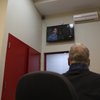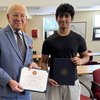Peter Petruski answers the call to lead Guilderland’s library
GUILDERLAND — “Public libraries nurture the soul of the community,” said Peter Petruski, the new director of the Guilderland Public Library.
He started his job here on May 22, the day after the $4 million library budget passed with 70 percent of the vote.
Petruski took that as a sign that there is widespread support for the library despite being rocked by allegations of racism leveled by the owner of the library’s first café when she abruptly closed in February.
While he noted the library is in “challenging times,” he said, “Every organization has some challenges.”
The library’s board of trustees, Petruski said, was “transparent” during the hiring process about the café closure. Petruski watched a video of the Feb. 26 listening session the trustees held after the accusations were leveled and said he was “heartened” by the support he saw from the public.
“They wanted more information but were ready to support the library,” he said.
The board has hired an outside firm, Guidepost Solutions, for $15,000, to investigate the charges of racism and harassment while it formed its own committee to investigate the process that led to the library’s leasing of space to the café.
At his former job, at the Arlington Public Library in Virginia, Petruski was the lead contractor negotiator, evaluating requests for proposals, writing contracts, and ensuring vendor compliance.
Arlington’s library had “strict procurement rules,” Petruski said, adding, when negotiating, “I got the most I could.”
“It’s not the most glamorous part of the job,” Petruski said. “But it’s part of the public trust, to use money properly to benefit taxpayers.”
Petruski said he hopes to provide stability for the Guilderland library, whose former director retired four months ago.
“I don’t look at librarianship as a job or a career,” he said. “I look at it as a calling.”
Roots
It was in young adulthood that Petruski found his calling.
He grew up in Pleasant Valley, near Poughkeepsie, “where the suburbs meet the country,” he said.
His childhood home was on a gravel road with no sidewalks. “It was incredibly quiet,” he said. “It’s where I developed a love of reading and the outdoors.”
His parents, Petruski said, were both “intelligent, devoted readers.”
His father, who never finished high school, was a raconteur who worked for a moving company
His mother was strong and reticent. She worked with immigrants and their children, helping them navigate their new world.
Petruski, who suffered from chronic asthma, said, “I was sick a lot as a child so I’d go with my mother” as she did her work, which opened his eyes to other cultures and ways of life.
His mother had a home library, and Petruski could read whatever books he chose. “I read Dante’s Inferno in the fifth grade,” he said.
A family tradition, when a big snowstorm was predicted, Petruski recalled, was his mother would take him and his older sister, Kirsten, to the public library to stock up on books.
He still remembers reading Douglas Adams’s “A Hitchhiker’s Guide to the Galaxy” before one storm, which he said, “looks at what it means to be human.”
With no sidewalks by his home, he didn’t ride a bike as a boy. Rather, he said, “I would disappear into the woods.” There, he would explore and act out fantasies.
As Petruski sat in his new office at the library on Tuesday, looking out at a wide expanse of piney woods, he said that, when he lived in cities, he missed seeing rolling hills and woods.
“Seeing these trees makes my heart feel good,” said Petruski.
Schooling
Petruski was particularly fond of his third-grade teacher, Mr. Williams, who saw his potential and encouraged him to read, and of his fifth-grade teacher, Mr. Kittles, who encouraged him to write more.
He remembers writing a story as a fifth-grader about a snowman who came to life and, like a genie, granted wishes to children.
“I wish you would go away,” the children wished.
“Mr. Kittles burst out laughing when he read that,” Petruski recalled, “and then he read it to the class.”
While Petruski still describes himself as introverted, he emerged from his shell of childhood shyness. “I come to life with a group, in front of an audience,” he said.
After graduating from public school, he went to Dutchess Community College close to home to find his path, trying courses in communications, film, history, psychology, and sociology.
His English professor there, Keith O’Neill, was impressed with his writing and encouraged him to write for the college’s literary magazine.
“That gave me a direction and pulled me back to literature,” Petruski said.
He knew then he wanted to do something with reading and books and went on to graduate from the State University of New York at New Paltz with a major in English and creative writing.
He was at a graduate-school fair at the University of Albany when he had an aha moment. As he walked by a table for Albany’s library school, he stopped and asked himself, “That’s a career?” He had thought of libraries as being run by volunteers.
“I thought they did it because they loved books,” said Petruski. “That resonated with me. It felt right. I would get to help others discover the joy of reading.”
He went straight to UAlbany for a master’s degree in library science and later got a second master’s degree from George Mason University in public administration.
One of the classes he took at UAlbany was taught by Barbara Nichols Randall at the Guilderland Public Library where she was the director.
Petruski’s sister, a psychiatrist who lives in South Carolina, “was the first member of our family to graduate from college. I was the second. She was the first to get a master’s; I was the second. Then she got a Ph.D. I stopped there,” said Peteruski with a smile.
A calling
During his library studies at UAlbany, Petruski regularly made the 90-minute commute to his hometown library where he worked the front desk, a job he loved.
“Customer service is the bread and butter of running a library,” he said. “You want the public to feel welcome, wanted … A public library belongs to the public.”
Petruski graduated into the Great Recession and got his first job at Green Mountain College in Vermont.
He had a series of jobs in technical services at libraries, which he called “very lonely.”
“I strayed away from what I cared about,” he said.
After a six-year stint at a library in central Pennsylvania and two years at a library in southern Maryland, he started the job at the Arlington library in Virginia, learning about budgeting, planning, and personnel management with the goal of leading a library.
Last year at Arlington, Petruski worked with the county in writing a Book Sanctuary Proclamation.
With the nationwide movement banning books, he said, “A lot of libraries have been reactive, under attack. I wanted us to be proactive … coming out in front on the freedom to read.”
The Arlington library was “heavily impacted by the pandemic,” closing for two years, Petruski said, during which time “membership dropped precipitously.”
Guilderland’s use has now risen to exceed pre-pandemic levels, the interim director, Nathniel Heyer, told The Enterprise earlier.
In Arlington, Petruski worked on a Bring Back the Patrons initiative, increasing cardholders from 50,000 to 90,000.
This was done, he said, by removing barriers, like charging fines for overdue books, and increasing funding for new purchases, which had been flat for a decade.
“I believe in making a difference in my community,” said Petruski. “By leading the library, I can steer the ship. I want to hear what the community is interested in and then get everyone to pull in the same direction.
“Libraries are built on public trust,” he reiterated. “We have to have everyone working towards the same goal.”
Libraries are especially important, Petruski said, “when times are tough and money is tight.”
They can help people explore, for example, learning new hobbies and skills.
Petruski, who has been binge-watching The Great British Baking Show, is “trying to get into baking” and is using books as his guide.
“Public libraries give people permission to explore,” he said. “Life can become one task after another. Public libraries give people permission to get off the treadmill of life.”
Referring to another of his core beliefs, Petruski said, “I believe strongly in sustainability and environmentalism. A public library is about shared resources … As a society, we’re encouraged to buy, to consume.”
He noted that Guilderland has a Library of Things, to which life jackets have just been added.
“Everyone doesn’t have to have something for themselves,” he said.
Petruski said it is “far too soon” to say how long he plans to be at the helm in Guilderland but as he settles into his Altamont home, a short commute from the library, he said the staff has been very welcoming.
“This is what I’ve been building my entire career for …,” Petruski said of leading a library. “I have high hopes for myself and high standards for myself.”
He recalled, when he got the offer to be Guilderland’s library director, he turned to a friend and said, “I’m coming home.”



